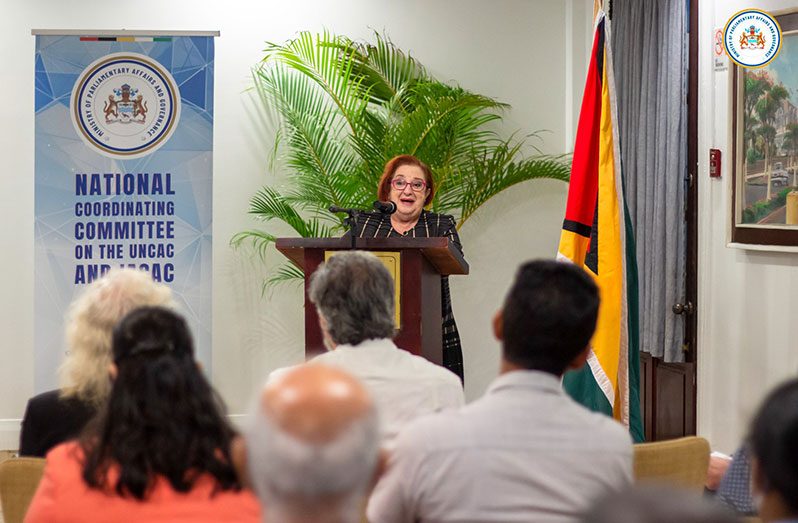–through consistent efforts to fortify Guyana’s anti-corruption framework, policies
SIGNIFICANT progress has been made over the past two years to fortify Guyana’s anti-corruption framework and policies, thereby fostering greater transparency and accountability, Minister of Parliamentary Affairs and Governance Gail Teixeira has said.
Minister Teixeira outlined the government’s achievements and plans in her statement commemorating World International Anti-Corruption Day, which is being observed under the theme, “Promoting Transparency and Strengthening Institutions”.
She related that Guyana’s anti-corruption framework and policies are implemented through constitutional, statutory and parliamentary oversight bodies.
The minister affirmed, too, that there are constitutional provisions that protect the independence of the constitutional post-holders and bodies from interference.
That said, she added: “Guyana also has ongoing legislative reform that provides for greater transparency and accountability to prevent, detect and prosecute acts of corruption, and there is oversight of government at the national, regional and international levels with the anti-corruption conventions Guyana has ratified.”
Guyana, Minister Teixeira said, has a total of 16 constitutional bodies with specific responsibilities across key sectors, including human rights and anti-corruption, which all enjoy independence in the execution of their mandates.
In an effort to enhance transparency, and ensure that the public is well informed, the government has also upgraded many government websites.
Further, the government, through the Ministry of Parliamentary Affairs and Governance, established a National Coordinating Committee (NCC) on the implementation of the United Nations Convention Against Corruption (UNCAC), and the Inter-American Convention Against Corruption (IACAC).
Some 16 agencies are represented on the committee, which enhances institutional and systematic inter-agency collaboration, and builds capacity within the anti-corruption framework of the country.
Guyana ratified the UN Convention Against Corruption on April 16, 2008, and the Inter-American Convention Against Corruption, the first treaty of this nature, on December 11, 2000.
The country’s seriousness is demonstrated by its anti-corruption framework document, which was published on June 20 by the ministry. Since its formation, the NCC has organised two training workshops on anti-corruption measures in the country, and those focused on sensitising participants from the government, private sector and civil society on the need to uphold the key pillars of transparency and accountability in relation to their sectors.
It is evidenced by the many initiatives that the Government of Guyana remains committed to not only upholding the constitution, democracy, and human rights, but also to strengthening the mechanisms and measures necessary for greater transparency and accountability, inclusion, and participation.
Guyana was praised in the September 2022 Article IV report of the International Monetary Fund (IMF) for the recent amendments to the Natural Resource Fund (NRF) Act.
“Not only has there been a strengthening of anti-corruption measures, noteworthy are the number of cases before the courts for corruption of state assets by former government officials and functionaries, including electoral conspiracy and fraud, as well as bribery and other acts of corruption,” Minister Teixeira said.
Despite challenges of timely data collection, investigative and prosecutorial capacities and timely judicial decisions, Guyana continues to make progress in its fight against corruption.



.jpg)








